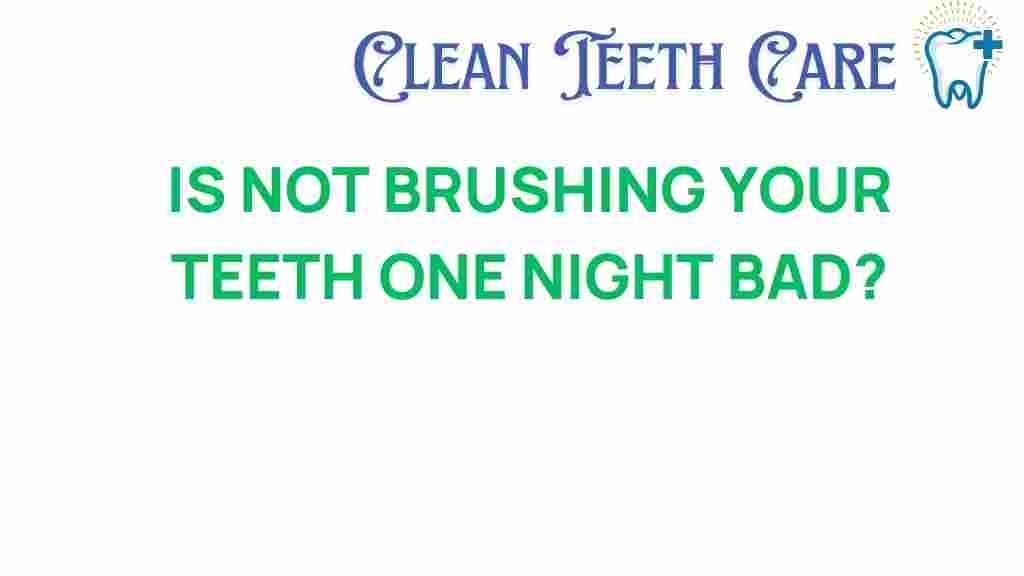The Surprising Impact of Skipping One Night of Brushing Teeth
Maintaining good dental hygiene is essential for overall oral health. While we all have busy lives, and it may be tempting to skip brushing our teeth just once, the consequences can be surprising and detrimental. In this article, we will explore the impact of neglecting to brush your teeth for a single night, how it affects cavities, plaque buildup, and the risk of gum disease. We will also discuss the importance of good brushing habits and preventive care as part of your nighttime routine.
Understanding the Importance of Nighttime Brushing
Brushing your teeth at night is crucial for several reasons:
- Removal of Food Particles: After a day of eating, food particles can linger in your mouth, providing a breeding ground for bacteria.
- Reduction of Plaque: Plaque forms continuously, and brushing before bed helps to remove it, preventing it from hardening into tartar.
- Prevention of Cavities: By brushing at night, you reduce the chances of cavities forming due to the acid produced by bacteria feeding on leftover sugars.
- Protection Against Gum Disease: Regular brushing helps to keep your gums healthy, reducing the risk of inflammation and infection.
When you skip brushing for just one night, the consequences can start to unfold rapidly.
The Immediate Effects of Skipping One Night
After just one night without brushing, several changes can occur in your mouth:
- Increased Bacterial Growth: Bacteria thrive in a warm, moist environment, such as your mouth. Without brushing, their numbers can double overnight.
- Formation of Plaque: Plaque, a sticky film of bacteria, begins to form within hours of eating. Skipping brushing allows plaque to accumulate.
- Morning Breath: The smell of morning breath is not just unpleasant; it’s a sign of bacterial overgrowth and poor oral hygiene.
Even though these effects may seem mild, they can lead to more serious issues if the habit of skipping brushing becomes frequent.
Long-Term Consequences of Poor Brushing Habits
If you find yourself skipping brushing regularly, the long-term effects can be severe:
- Cavities: Bacteria feed on sugars, producing acid that erodes tooth enamel. This can lead to cavities, which may require fillings or other dental work.
- Gum Disease: Plaque buildup can lead to gingivitis, the first stage of gum disease, characterized by swollen and bleeding gums. If untreated, it can progress to periodontitis, resulting in tooth loss.
- Bad Breath (Halitosis): Chronic bad breath can be a result of ongoing neglect of dental hygiene, leading to social and personal issues.
- Tooth Loss: Severe gum disease can lead to the loss of teeth, which can have lasting effects on your health and confidence.
Brushing Habits: The Key to Preventive Care
Good brushing habits are essential for effective preventive care. Here are some tips to enhance your nighttime routine:
Step-by-Step Brushing Technique
- Choose the Right Toothbrush: Use a soft-bristled toothbrush that fits comfortably in your mouth.
- Use Fluoride Toothpaste: Select a toothpaste that contains fluoride to strengthen enamel and fight cavities.
- Brush for Two Minutes: Spend at least two minutes brushing, ensuring you cover all surfaces of your teeth.
- Technique Matters: Use gentle circular motions and don’t forget to brush your tongue to remove bacteria.
- Rinse Thoroughly: After brushing, rinse your mouth with water or mouthwash to remove any remaining debris.
- Floss Daily: Don’t forget to floss to remove plaque and food particles between your teeth.
Creating a Consistent Nighttime Routine
A consistent nighttime routine can help ensure you never skip brushing your teeth:
- Set a Reminder: Use your phone to set a nightly reminder to brush your teeth.
- Keep Your Supplies Handy: Store your toothbrush and toothpaste in a visible and convenient location.
- Connect Brushing with Another Habit: Tie your brushing routine with another nightly activity, such as washing your face or reading a book.
- Make It Enjoyable: Listen to music or a podcast while brushing to make the experience more enjoyable.
Troubleshooting Common Issues
Sometimes, individuals may encounter issues with their brushing habits. Here are some troubleshooting tips:
Problem: Sensitive Teeth
If you experience sensitivity while brushing:
- Consider using a toothpaste designed for sensitive teeth.
- Brush gently to avoid irritation.
- Consult your dentist if sensitivity persists.
Problem: Bad Breath
If bad breath remains an issue:
- Ensure you are brushing and flossing effectively.
- Stay hydrated, as dry mouth can worsen bad breath.
- Consider using mouthwash for extra freshness.
Problem: Bleeding Gums
If your gums bleed when brushing:
- Switch to a softer toothbrush.
- Brush more gently and avoid aggressive techniques.
- Schedule a visit with your dentist to rule out gum disease.
Conclusion: Prioritize Your Dental Hygiene
Skipping just one night of brushing your teeth may seem harmless, but the ripple effects can lead to serious issues over time. By understanding the importance of dental hygiene and the surprising consequences of neglect, you can take proactive steps to protect your oral health. Establishing good brushing habits and a consistent nighttime routine is essential for preventing cavities, plaque buildup, and gum disease. Remember, preventive care is always better than dealing with the aftermath of neglect.
For more information about caring for your teeth and maintaining your oral health, visit Mouth Healthy for tips and resources.
Start prioritizing your dental hygiene today, and you’ll thank yourself tomorrow!
This article is in the category Hygiene and created by CleanTeethCare Team
